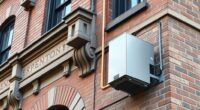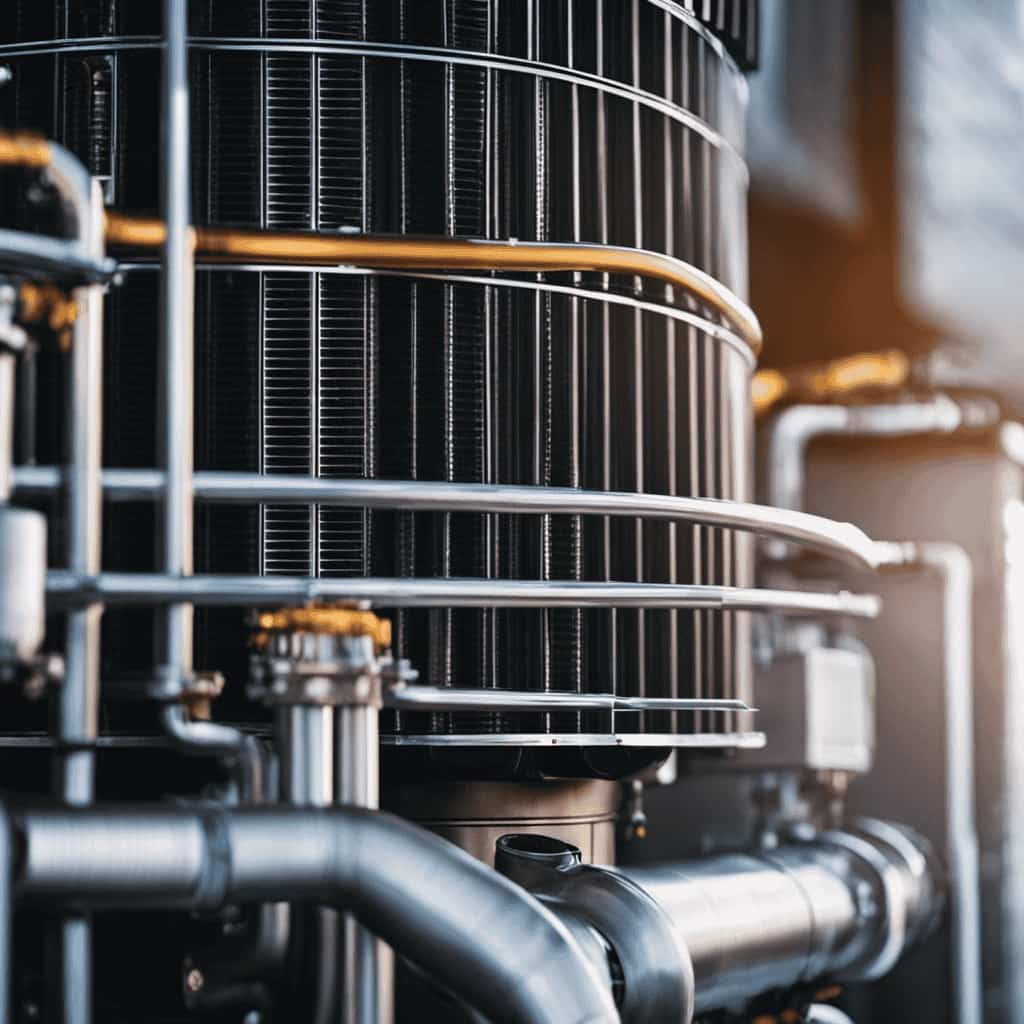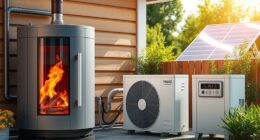Building codes set safety, efficiency, and performance standards for heat pump installations, influencing how you select, install, and maintain your system. They specify requirements like sizing, venting, clearance, and efficiency ratings, guaranteeing reliable operation and safety compliance. Updated standards, such as those from AHRI and ASHRAE, incorporate new technology and efficiency metrics, guiding your choices. Staying current with these evolving regulations helps you ensure long-term system performance and safety—keep exploring to learn more.
Key Takeaways
- Building codes set safety, performance, and efficiency standards for heat pump installation and operation, ensuring compliance and safety.
- Standards like ASHRAE 90.1 and IECC influence local regulations, affecting insulation, wiring, outdoor clearance, and noise limits.
- Updated efficiency requirements (SEER2 and HSPF2) specify minimum performance levels for new heat pump units.
- Certification through AHRI verifies equipment performance, while permits and inspections ensure proper installation and safety compliance.
- Staying current involves reviewing evolving standards, participating in training, and consulting local authorities and code resources.
Overview of Building Codes for HVAC Systems

Building codes for HVAC systems set essential safety, performance, and efficiency standards that you must follow to guarantee your system operates reliably. These codes, established by local, state, and federal authorities, specify requirements for HVAC system design, including proper sizing, installation practices, venting, clearance, and safety devices. Compliance is crucial because it ensures your system meets legal requirements, helps you pass inspections, and secures necessary permits. Different regions may adopt standards like the IRC, IECC, or ASHRAE 90.1, which influence design and installation practices. Staying current with local building code updates is vital to maintaining compliance. Additionally, understanding the specific building code requirements for heat pumps can help prevent costly errors during installation. Proper adherence to these codes not only promotes safety and efficiency but also ensures your heat pump functions optimally within legal parameters. Following these standards can also enhance energy efficiency and reduce operational costs over time. Regular review of local regulations is recommended to ensure ongoing compliance and to incorporate new safety or performance standards as they are updated. Incorporating proper installation practices from recognized standards can further improve the longevity and effectiveness of your HVAC system. Moreover, integrating energy-efficient appliances like heat pumps with certified compliance can contribute to achieving energy-saving goals mandated by local policies.
Key Standards Influencing Heat Pump Installations

Understanding the key standards for heat pump installations helps guarantee compliance and energy efficiency. These standards include updated efficiency requirements like SEER2 and HSPF2, which vary regionally and impact your equipment choices. Certification and compliance resources, such as the AHRI Directory, are essential tools for verifying that your units meet the latest regulations. Additionally, adhering to nutritional standards ensures that equipment operates at optimal performance levels and supports sustainable building practices. Incorporating refrigeration cycle efficiency metrics can further optimize system performance and environmental impact. Recognizing the importance of energy management strategies can also provide insights into system optimization within different environments. Considering zodiac sign compatibility principles can also provide insights into energy patterns and system harmony within different environments. Recognizing the importance of angel numbers can offer additional spiritual guidance during the installation process.
Updated Efficiency Requirements
Have you noticed recent changes in heat pump efficiency standards? The 2023 Appendix M1 standards now require split-system heat pumps to meet at least 14.3 SEER2 and 7.5 HSPF2, roughly matching 15 SEER and 8.8 HSPF under older ratings. These efficiency standards are enforced nationwide, ensuring consistency across regions. Here’s what you should know:
- New installations after January 1, 2023, must meet these updated standards.
- Units manufactured before that date can still be installed.
- The goal is to boost energy efficiency and lower environmental impact.
- Incorporating protective styling benefits can help maintain the longevity and performance of heat pump components.
- Understanding compliance standards is essential for proper installation and certification.
- Staying informed about personality test insights can also foster better communication with clients about energy-saving options.
- Additionally, industry regulations are continuously evolving to promote sustainable building practices.
- Advances in heat pump technology contribute to higher efficiency and better performance in modern systems.
These standards help you select more efficient, eco-friendly heat pumps that comply with current regulations.
Regional Code Variations
Recent updates to heat pump efficiency standards set a nationwide baseline, but local building codes can profoundly influence installation requirements. Regional regulations often reference standards like ASHRAE 90.1 and IECC, with local amendments adding specific mandates. These variations can affect code compliance, especially regarding insulation, ventilation, and electrical wiring standards. Some regions impose stricter outdoor clearance, setback distances, and noise restrictions, which vary by area. To ensure compliance, you need to consult local building departments and follow jurisdiction-specific standards. Awareness of AI ethicist jobs and other emerging roles can help professionals navigate evolving regulatory landscapes. Staying informed about building code updates is essential for successful installations. Additionally, understanding regional climate considerations can further influence specific installation requirements. Recognizing these regional regulatory differences is crucial for proper heat pump deployment and avoiding costly modifications. Moreover, local environmental conditions can impact the selection of appropriate systems and installation practices. The table below highlights key regional differences:
| Aspect | Regional Variations |
|---|---|
| Efficiency standards | Stricter in some areas |
| Outdoor clearance | Varies by jurisdiction |
| Insulation & ventilation | Local amendments may differ |
| Noise restrictions | Different restrictions across regions |
Certification and Compliance Standards
Are your heat pump installations compliant with the latest certification and performance standards? Staying current with certification and compliance standards is essential to meet HVAC codes and guarantee efficiency. The AHRI Directory certifies HVAC equipment, including heat pumps, confirming they meet performance and efficiency benchmarks.
You should also be aware of the 2023 standards update, which introduces Appendix M1, setting new minimum SEER2 and HSPF2 ratings. To help, here are three key points:
- Equipment manufactured after January 1, 2023, must meet minimum efficiency levels like 14.3 SEER2 and 7.5 HSPF2.
- Equipment made before the update can still be installed legally.
- Regulatory agencies provide resources to verify that your heat pumps adhere to certification and compliance standards, ensuring safe, efficient operation. Compliance verification is crucial for maintaining standards.
- Additionally, support hours for various services can impact your ability to obtain timely assistance with compliance questions.
- Incorporating cultural intelligence strategies into your team can improve communication with diverse stakeholders involved in compliance processes, enhancing overall effectiveness. Understanding the importance of performance standards helps in ensuring your installations meet all regulatory requirements. Staying informed about industry certifications can further streamline your compliance efforts and ensure long-term success.
Recent Updates to 2023 Heat Pump Standards

The 2023 updates to heat pump standards introduce significant changes aimed at boosting energy efficiency across residential units. These new heat pump standards, detailed in revised Appendix M1, set stricter efficiency metrics for better building code compliance. For split-system heat pumps, the minimum SEER2 is now 14.3, and the HSPF2 must be 7.5, aligning with traditional standards like 15 SEER and 8.8 HSPF. Single packaged units must meet 13.4 SEER2 and 6.7 HSPF2. Units manufactured before January 1, 2023, remain installable, but the updated standards apply to new units moving forward. These changes emphasize improving energy efficiency, helping homes meet federal and local regulations while enhancing overall performance. Incorporating natural elements and mindful design principles can further optimize the energy performance of heating systems within compliant building environments. Regular maintenance and proper filtering systems are also vital to ensure that heat pumps operate at peak efficiency and longevity. Additionally, understanding building codes and staying current with evolving standards is essential for contractors and homeowners to ensure compliance and maximize system benefits.
Compliance Requirements for Residential Heat Pumps
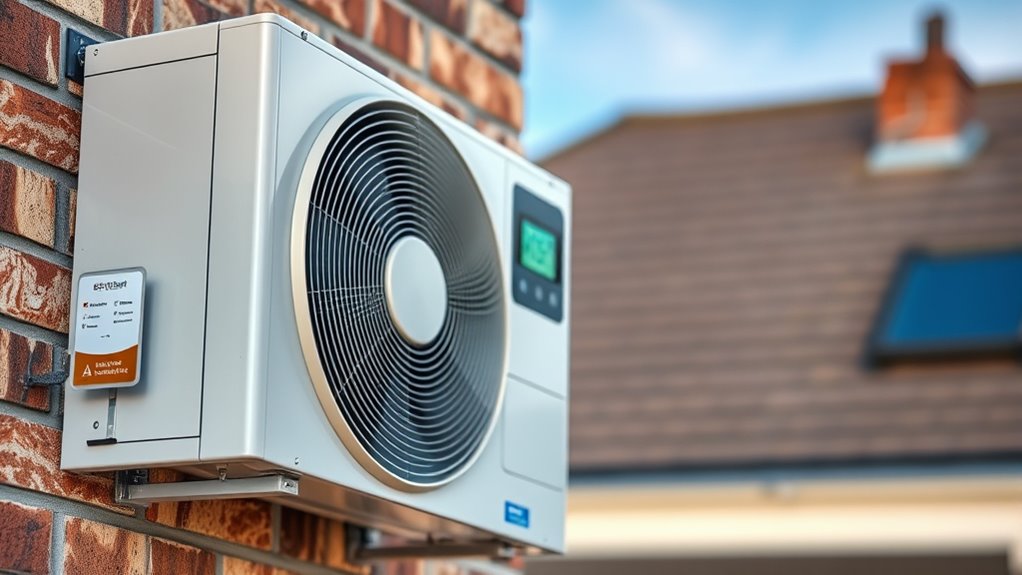
Ensuring compliance with the 2023 standards is essential for residential heat pumps to operate legally and efficiently. Building codes now require all new installations to meet specific energy efficiency criteria. To stay compliant, you should:
- Verify that the heat pump’s SEER2 and HSPF2 ratings meet the minimum standards—14.3 SEER2 and 7.5 HSPF2 for split systems, and 13.4 SEER2 and 6.7 HSPF2 for single-pack units.
- Use only units certified by manufacturers, with performance data verified through the AHRI Directory.
- Ensure that local building codes and permits confirm the installation adheres to these federal efficiency standards.
Following these steps guarantees your heat pump installation aligns with the latest energy conservation requirements.
Regulatory Resources and Support for Contractors

You have access to industry contact channels that can quickly connect you with regulatory experts for guidance. The ICC Premium Answers platform offers easy-to-use tools for obtaining compliance support and understanding complex building codes. With these resources readily available, you can stay informed and confident in meeting regulatory requirements for heat pump installations.
Industry Contact Channels
Industry contact channels provide contractors with essential support and guidance to navigate updated heat pump standards and building codes. These channels connect you with the regulatory team, helping guarantee compliance through clear communication. You can reach out via various methods, including phone, email, or online portals, for quick clarification on installation requirements or code updates. The support team helps interpret national standards like the 2023 Appendix M1 heat pump standards and local code mandates, making compliance easier. To stay informed and resolve issues efficiently, consider these key resources:
- Phone support for immediate questions
- Email correspondence for detailed inquiries
- Online portals for accessing updated standards and permit info
Using these industry contact channels ensures you stay compliant and up-to-date with evolving building codes.
Compliance Guidance Access
Access to all-encompassing regulatory guidance is essential for contractors aiming to comply with heat pump standards and building codes. The regulatory team provides clear compliance guidance and answers to questions related to adherence to these standards. You can contact them through dedicated communication channels to clarify requirements, understand local amendments, and navigate installation protocols and certification processes for heat pumps. This support helps you stay aligned with updated standards, such as the 2023 Appendix M, ensuring your projects meet all necessary regulations. Reliable resources and expert advice are designed to improve compliance accuracy and reduce regulatory challenges. By leveraging these tools, you can confidently navigate building codes, streamline your processes, and ensure your heat pump installations are compliant with current standards.
Resource Availability
How can contractors efficiently find the regulatory resources they need for heat pump projects? The key is leveraging digital platforms like ICC Premium, which offers instant access to up-to-date building codes and HVAC regulations. This platform includes expert-verified responses, ensuring you get accurate guidance. Its section-level printing controls help you quickly print specific code sections for compliance documentation. Navigation is user-friendly, so you can easily locate rules, requirements, and best practices relevant to heat pump installation. With regular updates through October 2023, you stay current with evolving standards. Relying on ICC Premium streamlines your compliance efforts, simplifies code interpretation, and supports certification processes. It’s an essential resource for contractors committed to adhering to building codes and HVAC regulations efficiently.
The Role of Permits and Inspections in Ensuring Safety

Obtaining permits before installing a heat pump is essential to guarantee the system meets local building codes and safety standards. Permits ensure your installation complies with regulations designed to protect you and your property. Inspections play a crucial role by verifying that all aspects of the installation—such as wiring, venting, and refrigerant handling—are correctly completed. Routine inspections are required during installation and periodically afterward to confirm ongoing safety and performance. Proper permitting and thorough inspections help prevent hazards like refrigerant leaks, electrical failures, and fire risks. Skipping these steps can lead to fines, rework, or legal liabilities. By adhering to permit and inspection requirements, you ensure your heat pump operates safely, efficiently, and in full compliance with regulations.
Innovations and Technological Advances in HVAC Regulations

Recent innovations in HVAC technology have markedly shaped building codes to promote energy efficiency and environmental responsibility. These technological advances include variable-speed compressors and smart controls, enabling heat pumps to meet stricter standards. HVAC regulations now incorporate innovations like hybrid heat pump systems and refrigerant improvements to guarantee compliance with eco-friendly goals. Additionally, modern codes require testing and certification of features such as advanced defrosting and zone control, ensuring safety and performance. Building codes also incentivize inverter-driven heat pumps and AI-powered control systems, aligning standards with emerging tech. Updates to standards like Appendix M and M1 reflect the integration of innovative materials, enhanced performance metrics, and digital monitoring features, driving the evolution of HVAC regulations in line with technological progress.
Strategies for Staying Current With Evolving Standards

Staying current with evolving standards requires proactive engagement with industry updates and regulatory changes. To guarantee standards compliance, you should regularly review updates from organizations like AHRI, ICC, and ASHRAE. Subscribing to industry newsletters and official notices helps you stay informed about new or revised building codes affecting heat pump installations. Participating in training sessions, webinars, and conferences focused on recent developments enhances your professional development and deepens your understanding of current requirements. Additionally, consulting local building departments and regulatory agencies ensures you’re aware of regional variations and specific installation guidelines. Using resources like the ICC Digital Codes platform provides quick access to the latest code editions and guidance documents. Staying engaged with these strategies helps you adapt efficiently to changing standards.
Impact of Building Codes on Long-Term System Performance
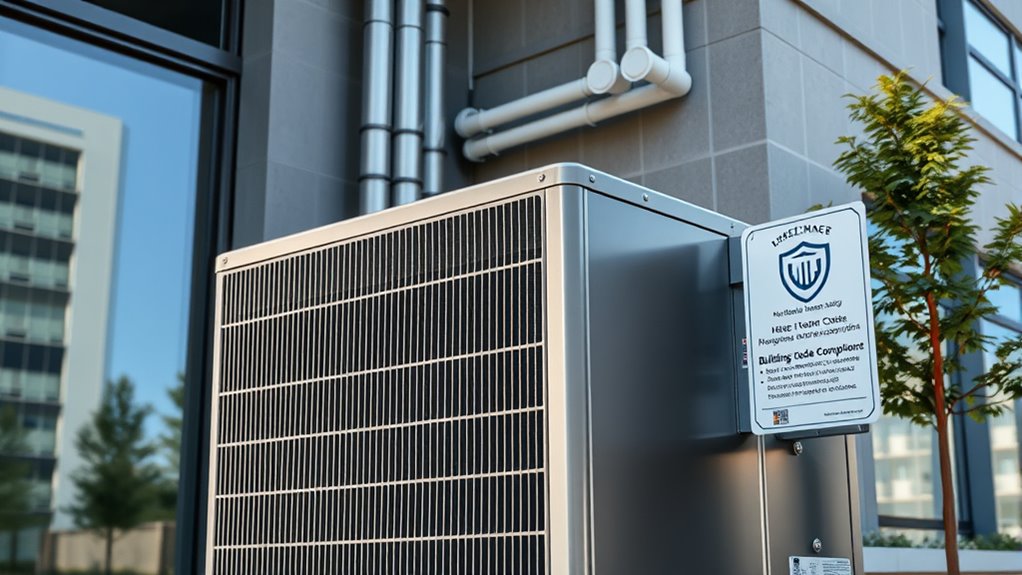
Building codes play a crucial role in shaping the long-term performance of heat pump systems by setting minimum installation and safety standards. When you follow these codes, you guarantee your system operates reliably and efficiently over time. Proper sizing, venting, and insulation, as mandated by building codes, prevent early failures and reduce maintenance costs. Regular inspections and safety devices help maintain energy efficiency and prevent deterioration that could compromise system performance. Additionally, standards for energy efficiency and quality assurance encourage the use of durable components, extending your heat pump’s lifespan.
Consider these key impacts:
- Correct installation minimizes operational issues.
- Safety requirements prolong system longevity.
- Energy efficiency standards optimize performance over time.
Frequently Asked Questions
What Is the Code for a Heat Pump?
When you ask about the code for a heat pump, you’re likely looking for the specific standards it must meet. You need to verify your heat pump is listed and approved for residential use, following safety and efficiency guidelines. Check local building codes and the IRC, which specify clearances, venting, and electrical requirements. Make sure it conforms to efficiency standards like SEER and HSPF to stay up to code.
What Are the New Heat Pump Standards?
You’re asking about the new standards for heat pumps. The 2023 updates, especially Appendix M1, set higher efficiency requirements. Split-system units now need at least 14.3 SEER2 and 7.5 HSPF2, while single-packaged units must meet 13.4 SEER2 and 6.7 HSPF2. If your unit was made before January 1, 2023, it can still be installed, but new units must meet these stricter efficiency standards to comply nationally.
What Are the Codes and Standards for HVAC?
Did you know that over 80% of new buildings in the U.S. must meet strict HVAC standards? When you’re working on HVAC systems, you need to follow codes like ASHRAE 90.1, IECC, UMC, and NEC. These standards guarantee safety, efficiency, and proper performance. Staying updated with these regulations helps you install reliable systems that pass inspections, protect occupants, and meet legal requirements.
What Is the NEC Code for Heat Pumps?
The NEC code for heat pumps requires you to install dedicated circuits to prevent overloads and guarantee safety. You need to wire them according to NEC Article 440, including proper conductors, disconnects, and overcurrent protection. Make sure disconnect switches or circuit breakers are easily accessible and clearly labeled near the unit. Also, follow NEC guidelines for ground-fault protection if applicable. Proper wiring and grounding help you stay safe and compliant.
Conclusion
Guiding building codes is like steering a ship through changing tides—you need to stay alert and adaptable. When I first helped a contractor update a heat pump installation, we discovered new standards that improved efficiency and safety. Just like tuning a musical instrument ensures harmony, staying current with regulations guarantees your systems perform reliably and comply effortlessly. Keep learning and adjusting—you’ll sail smoothly, delivering exceptional comfort and safety to every project.

